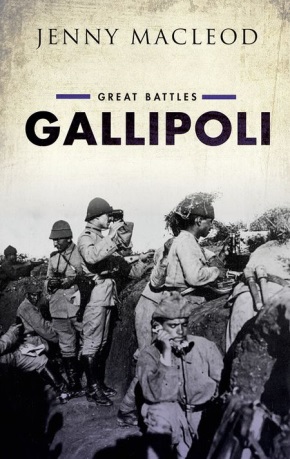Bookshops have seen no shortage of new products with the word ‘Gallipoli’ in their titles over the past few months, so my challenge here is to explain what makes Gallipoli a little different.
The book is one of four titles in Professor Hew Strachan’s ‘Great Battles Series’ with Oxford University Press. The series seeks to tell the story of the world’s most important battles – how they were fought, how they have been commemorated, and the long historical shadows that they have cast.
Leaving aside the debate whether Gallipoli was a ‘battle’ or a ‘campaign’ in the Dardanelles region, we are now all reasonably familiar with the fact that the British-led Mediterranean Expeditionary Force that attacked the Ottoman Empire in early 1915 was a multi-national affair, including English, Scottish, Welsh, Irish, Australian, New Zealand, French, and Indian soldiers; and that, ultimately a failure, the campaign ended with the withdrawal of the Allied forces after less than nine months.
The first 67 pages of Gallipoli cover the historical facts surrounding the event. The remaining 124 pages consider how the battle has been remembered, from the immediate aftermath to the present day. Four chapters address this issue from the Australian, New Zealand, British and Irish, as well as the Turkish perspectives.
In Britain, the campaign led to the removal of Churchill from his post as First Lord of the Admiralty and the abandonment of the plan to attack Germany via its ‘soft underbelly’ in the East. Thereafter, it was largely forgotten on a national level, commemorated only in specific localities linked to the campaign. For the southern Irish, meanwhile, the bitter memory of service for the King in a botched campaign was forgotten for decades.
In post-war Turkey, by contrast, the memory of Gallipoli played an important role in the formation of a Turkish national identity, celebrating both the ordinary soldier and the genius of the republic’s first president, Mustafa Kemal. The campaign served a similarly important formative role in both Australia and New Zealand, where it is commemorated annually on Anzac Day.
Shaped initially by the imperatives of war-time and the needs of the grief-stricken and the bereft, the memory of Gallipoli has been re-made time and again over the last century. For the Turks an inspirational victory, for many on the Allied side a glorious and romantic defeat, for others still an episode best forgotten, ‘Gallipoli’ has meant different things to different people, serving by turns as an occasion of sincere and heartfelt sorrow, an opportunity for separatist and feminist protest, and a formative influence in the forging of national identities.
The author’s characterisation of Gallipoli as a ‘civil religion’ in Australia, however, doesn’t sit comfortably with me although I appreciate the point she is trying to make about our national veneration of the campaign and the Anzac diggers.
Doctor Jenny Macleod is a Senior Lecturer in 20th Century History at the University of Hull, having previously worked at the University of Edinburgh and King’s College, London. A graduate of Edinburgh and Pembroke College, Cambridge, she is the co-founder of the International Society for First World War Studies and an associate editor of its journal, First World War Studies. Gallipoli draws from her earlier book Reconsidering Gallipoli published by Manchester University Press in 2004. Macleod was also a speaker at the Australian War Memorial’s “Gallipoli 1915: A Century On” international conference in March 2015.
Gallipoli includes 26 figures and four maps – all black and white. The notes and bibliography are comprehensive which will make the work valuable to scholars. A good quality index will similarly make the book easy to navigate for those interested in specific topics.
So much more than a dry historical account, Gallipoli provides several perspectives on the how the Gallipoli campaign has been remembered and what effect it has had on the societies that participated in those events. Macleod’s skill at comparing and contrasting those separate but parallel national evolutions is commendable. This is what makes this book different from the others and worth reading.

Contact Marcus Fielding about this article.






